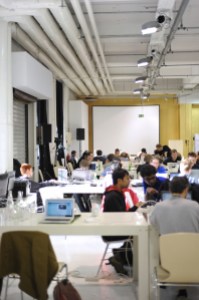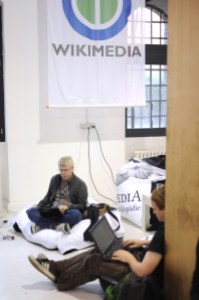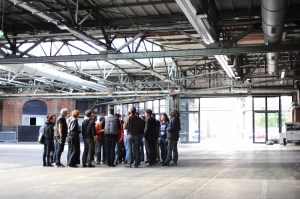
The Wikimedia technical community is gathering this week-end in Berlin to code, discuss, learn and generally improve the infrastructure and tools behind Wikipedia and its sister sites.
The “Berlin Hackathon 2012“, a yearly coding event happening in the German capital since 2009, is co-organized by Wikimedia Deutschland. It is taking place this year at STATION Berlin, a former postal train station now converted to an exhibition and event hall. It was preceded by a two-day summit on Wikidata and RENDER, projects aiming to integrate structured data with Wikipedia.
The crowd of about 130, coming from 30 countries, includes Wikimedia Operations engineers, who maintain the site’s hardware and network infrastructure, and MediaWiki developers, who build and improve the software powering all Wikimedia sites. Topics of discussion and workshops include the new code review workflow after the move of the primary code repository to Git, in an attempt to facilitate contributions.
“This is the largest Wikimedia coding event we’ve ever had,” started Sumana Harihareswara, Engineering Community Manager at the Wikimedia Foundation, as she opened the event. Sumana, the lead organizer of the event, has reached out to many Wikimedian technologists outside the core circle of MediaWiki developers, to make the event more inclusive. Indeed, many attendees are joining a Wikimedia coding event for the first time.

For example, expert Wikipedia editors have been invited to learn about Lua scripting, which is poised to replace or supplement MediaWiki templates later this year.
Templates, originally introduced as a way to embed standardized texts in several Wikipedia articles, have been combined by Wikipedians with parser functions to create a limited programming language. They have become a performance bottleneck for long Wikipedia articles embedding many of them, like Barack Obama, for which a new version of the page can take up to 40 seconds to be generated by the server.
By replacing complex templates by simpler ones augmented with Lua scripts, developers aim to provide editors with a proper scripting language that will be both more powerful and more efficient than ad-hoc ParserFunctions-based logic. Tutorials are being held in Berlin to help end-users learn about Lua and how to adapt templates to this new technology.
Another group of attendees is “Gadgets” maintainers, who have come to Berlin to learn how to adapt their tools to a new version of the software, called “ResourceLoader 2.0“. It will make it possible to centralize custom JavaScript snippets developed by editors, and share them across Wikimedia sites for other communities to use.

“We’ve never had so much activity in our technical community” explains Erik Möller, VP of Engineering and Product Development. “In Berlin, we’re systematically raising awareness of all the recent developments that are enabling more community-driven innovation than ever before. It’s a great time to be a Wikimedian.”
Besides coding, workshops and presentations, the event is also an opportunity for Wikimedia technologists, who usually collaborate over the internet, to mingle and socialize. They will next meet in July in Washington, D.C., for the annual Wikimania conference and its very own Hackathon. By then, they are expected to unveil the first working prototype of the Visual Editor, the upcoming user-friendly interface to edit Wikipedia articles.
Guillaume Paumier
Technical communications manager

Can you help us translate this article?
In order for this article to reach as many people as possible we would like your help. Can you translate this article to get the message out?
Start translation